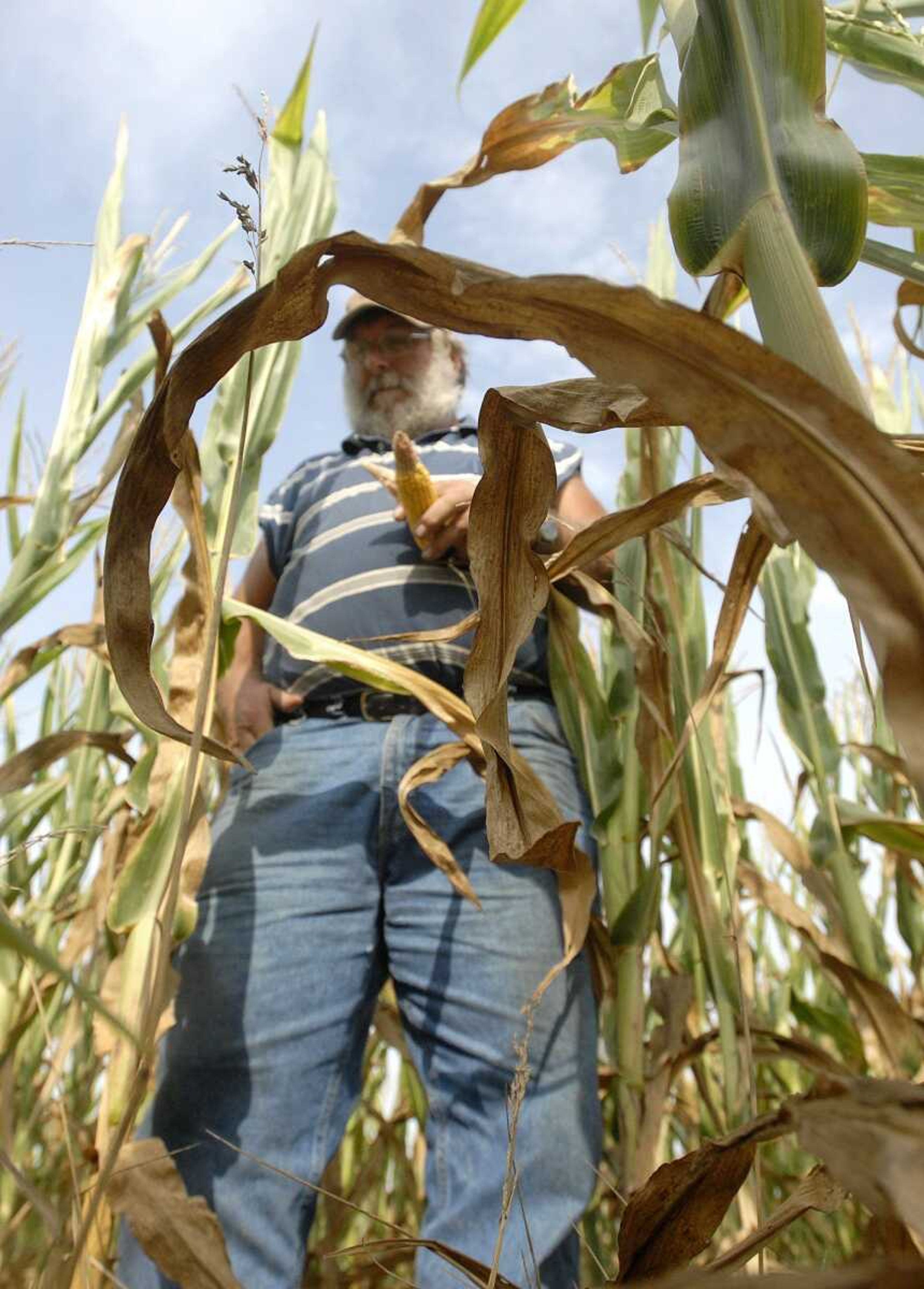The rain forecast for this weekend comes too little, too late for Southeast Missouri corn farmers.
Some estimate July's hot, dry weather may have cut their yields in half.
At Roger Schwab's farm outside Jackson, he's measured just four-tenths of an inch of rain since June 18.
"The corn is hurt, even if it does rain. The ears have already formed, and the kernel size is somewhat established," Schwab said.
He estimates his corn will probably make about 70 bushels an acre, when its normal yield would be 140 bushels an acre.
"I guess there have been worse years, but this ranks right up there close to the top, and I've been farming for 36 years," he said.
This summer is bringing back memories of the 1980 drought for both Schwab and Wayne Hoffman of Old Appleton.
Typically, Hoffman gets about 150 bushels an acre, but he's expecting this year's corn crop to produce more like 30 to 40 bushels per acre.
Gov. Jay Nixon on Thursday asked the Farm Service Agency to begin damage assessments in all 114 Missouri counties as a result of excessive heat and drought conditions. It's the first step in declaring counties as primary disaster areas. This designation makes farmers eligible for USDA emergency loan assistance.
Counties considered primary disaster areas must have a minimum 30 percent production loss of at least one crop in the county, according to FSA.
Terry Birk, director of the Cape Girardeau County Farm Service Agency, said he's seen some local corn crops where he'd estimate the yield loss as high as 70 percent.
"Even if we get rain now, it's too late," he said.
Low yields are especially disappointing this year because corn prices are at all-time highs, Geske said. The price of corn, about $7 a bushel, is up 72 percent from one year ago, according to the Chicago Board of Trade.
"Everybody had pretty high hopes going into the season and thought they were going to have a good year, said Mike Geske of Matthews, Mo., who serves on the National Corn Growers Association board of directors. "Those who were fortunate enough to plant early and those with irrigation will still do fairly well, just not as well as they thought they would."
April's record-setting 20.5 inches of rain delayed corn planting. Typically, all of Southeast Missouri's corn is planted by late April. This year, on May 8, less than half the region's corn was planted, according to USDA crop progress reports.
By planting late, farmers run the risk the heat will interfere with pollination.
"You need temperatures at nighttime to be cooler to help with pollination," said Anthony Ohmes, area agronomy specialist with the University of Missouri Extension.
Cape Girardeau's average evening low temperatures were about 10 degrees above normal for July, according to Jayson Wilson, meteorologist for the National Weather Service in Paducah, Ky.
Daily high temperatures averaged 92.7 during July. Low temperatures averaged 72.4 degrees.
"It has been unseasonably hot, but we haven't broken any records," Wilson said.
Cape Girardeau in July saw just 1.94 inches of rain, about half the month's average rainfall.
"This has been the most incredible weather year I've ever seen," Geske said. "We've had so much adverse weather all across the country."
Low-yielding crops may cause problems for some farmers who presold their grain this spring on contract. Some farmers may not have enough to fulfill their obligations and be forced to pay penalties to the companies expecting grain from them.
Schwab said he is confident he'll have enough to fulfill his contracts but that he may not have much left over to fill his grain bins and his contracts both.
There is still some hope for soybeans, which Ohmes describes as a more forgiving crop.
"Beans can rebound if we can get some August rains," he said. "It's amazing what a bean can do. Corn has a one-track mind, and once it starts the development cycle, it's hard to bring it back."
Schwab said his soybeans will be short this year, but they could still produce an average crop if the area gets some rain this month.
Until then, he's anxiously checking the weather radar on his iPhone.
mmiller@semissourian.com
388-3646
Pertinent address:
Jackson, MO
Connect with the Southeast Missourian Newsroom:
For corrections to this story or other insights for the editor, click here. To submit a letter to the editor, click here. To learn about the Southeast Missourian’s AI Policy, click here.








